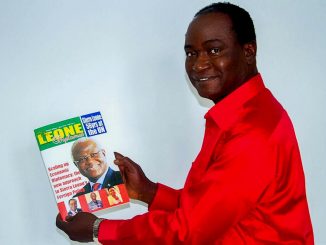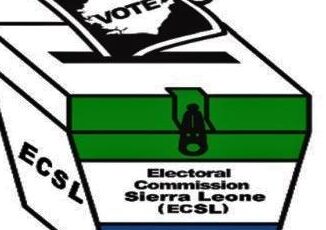
Overcoming hypocrisy is a serious challenge for the typical Sierra Leonean!
By Rev. Gibrilla Kargbo
February 8, 2021: In our beloved motherland, there is hardly anybody who would want to be in the bad books of the other person, especially where there is a power relationship, even if we know that what the other person is doing is outright wrong.
We have developed a penchant for allowing bad things to fester in our country for lack of courage in speaking the truth even if it is in love.
In public life, we hardly dare to tell our politicians and other public figures about their wrongs to the rest of society. Instead we adopt flattery in addressing them to the extent that hypocrisy and sycophancy have become the order of the day with far-reaching implications for bad governance. In our private lives, we also hardly face our children, spouses, other relatives, and friends with the truth even when things go bad with implications for moral decadence.
It must be noted with emphasis that the courage to say the truth and be honest with each other should be considered as a civic responsibility that has the potential to revolutionize our thinking and action in the best interest of our society and family in the context of our public and private lives.
The key objectives of this piece are to examine the causes of such hypocritical or sycophantic behaviour, examine scenarios of such conduct, consider the implications, and make recommendations to address the negative impacts.
Our starting point should be introspection and self-discipline such that we can say to ourselves “my actions were wrong” and thus the need for an an-about-face-turn with room for amends as we remedy the wrongs in public and private, as it were.
However, since we cannot face ourselves with the truth, it becomes almost impossible to face others with the truth. We then adopt a public life that is founded on and fostered by lies that we conjure up in our private lives. Page 1 of 9 Despite the irony contained in the text, a reminder is given about the famous lines of Shakespeare in Hamlet made by Polonius to his son, Laertes, as a token of advice as follows: This above all: to thine own self be true, And it must follow, as the night the day, Thou canst not then be false to any man. Farewell, my blessing season this in thee! (Hamlet, Act 1, Scene – III, 78 – 82)
In essence, to be positioned to speak the truth to others and not be hypocritical or sycophantic stems from a decision, to be honest to oneself regardless of what one stands to gain or lose. In other words, the springboard for being frank with others is the willingness to practice self-criticism or evaluation, which is different from self-condemnation.
A man or a woman who thoroughly examines or evaluates himself or herself can easily confront others with the truth that has the potential for a positive outcome. It has been observed by many that the truth establishes the atmosphere for relationships that can be mutually beneficial. In other words, a symbiotic relationship can produce better outcomes than one parasitically, with implications for something toxic.
It must be emphasised that the world can be better with honesty or the truth as the common denominator. All forms of ethical or moral education with implications for civic virtue can produce the best result on the platform of the truth and not on the foundation of dishonesty or lies.
However, most of the time, we have lived on self-deception to the extent that we become delusional, almost reaching the state of near impossibility in deciphering the truth even when it stares us in the face. For most of the time, we parade our private lies as public truths with towering and disastrous consequences and it is even worse when Page 2 of 9 the players are not just individuals, but groups that are bent on state capture using the platform of deception. The possibility for self-criticism and the ability or courage to face others with the truth is predicated on the ‘examined life’.
Socrates is noted for a famous quote indicating that “the unexamined life is not worth living”, with far-reaching implications for self-examination and establishing the standards by which others can be assessed or evaluated. It must be stated that when the criteria for self-examination are remarkably high, the standards for assessing or evaluating others cannot be otherwise.
We are looking at criteria-based performance for self-examination and the assessment or evaluation of others. It must be noted that because we do not usually examine ourselves on stringent criteria, it becomes almost impossible to put others on that pedestal, with most people resorting to conducts that can best be described as hypocritical or sycophantic with the resultant effect in the sad state affairs in the country with evidence of a lack of tangible development in almost every sector of the country even as we examine the last sixty (60) years of political independence.
However, whether it is self-examination or evaluating others, it must be based on a system of beliefs or values with our actions and thoughts assessed or evaluated against them. The question arises about standardisation with far-reaching implications for different schools of thought. As important as it is to what system of beliefs or values should be adopted for the effectiveness and efficiency of the assessment or evaluation, it must be emphasised that they should be founded on the truth and not on lies, knowing fully well that the truth uplifts and lies can only overthrow or destroy.
However, it must be stated that over time, we have been able to distinguish lies from truths by providing measurement standards for ourselves and others. It stands to reason that our continued assessment or Page 3 of 9 evaluation or examination of ourselves or others should ultimately take us to the place where we speak and live the truth in private and public and avoid double standards. Speaking about double standards in assessing or evaluating or examining ourselves or others, Jesus Christ in Matthew 7:3-5 makes this profound statement worth noting for a clear and thorough analysis of the situation: 3 And why do you look at the speck in your brother’s eye, but do not consider the plank in your eye? 4 Or how can you say to your brother, ‘Let me remove the speck from your eye’, and look, a plank is in your eye? 5 Hypocrite! First, remove the plank from your eye, and then you will see clearly to remove the speck from your brother’s eye.
This, then, is standard practice in living the examined life as we sincerely address the malaise of hypocrisy and sycophancy that has invaded our private and public lives with an impact on how much progress we can make to change the narrative in our beloved motherland, Sierra Leone.
No nation has ever thrived on lies with citizens who are hypocritical and sycophantic but on the truth with citizens who are bold and courageous enough to address the issues headlong.
It must be noted without hesitation that the enemies of the state are not those who condemn it openly; rather, it is those who pretend to be serving in her best interest with hypocrisy, lies, and sycophancy in the guise of blind loyalty so that when it is even in place to say this is not right without being impolite, they still say it is right. The courage to do right and be honest with a friend is captured in Proverbs 27:6, with the New Living Translation indicating thus: Wounds from a sincere friend are better than many kisses from an enemy!
As a people and as a nation, we have convinced ourselves to believe that our true friends must not tell us what we do not want to hear; instead, we prefer to surround ourselves with hypocrites Page 4 of 9 and sycophants as we feed on the lies repeated to us to bloat our egos and deny us the opportunity to face reality and become better as we fulfil our prophetic destinies.
We are further plagued by the bad traditional practice of believing that the leader is always correct even when their actions can best be described as reprehensible. We often prefer to suffer in silence rather than address the issues, even if they can bring the leader down. Because of this bad habit that we have inculcated over the years, even so-called advisers end up becoming stooges and puppets in the hands of such a leader, which has implications for failure on a massive scale.
More often than not, those around the leader are blamed for what is wrong instead of asking the leader to take responsibility for his or her actions. This is why subordinates should not hesitate to stand for the truth, even if it means telling it in love. We have seen several examples of subordinates taking the blame for failure in leadership because the leader should not take responsibility for the problem; otherwise, he or she might not be respected.
Such a mythical or unrealistic way of viewing our leaders is the root of the problem and as such he or she prefers to have subordinates that know little or nothing and even if they know, they should pretend not to know as everyone is to rely on and even commend the wisdom of the leader to overcome whatever the challenges are. It must be emphasised that when leadership is not anchored on humility and the truth, it becomes difficult to get the citizens to copy the good examples. As such, they are forced to accept the failure of the ‘tough guy’ who ‘knows it all’ with evident hypocrisy, lies, and sycophancy, being cognizant that any expression of dissatisfaction will be viewed from a subversive perspective.
Encouraging hypocrisy, lies, and sycophancy in and around leadership is exemplified in the children’s story by Hans Christian Andersen titled “The Emperor’s New Clothes”, in which swindlers told the King that they were going to sew him a new suit that would be seen only by Page 5 of 9 those who are competent and not fools.
Even though the swindlers did not sew any suit for the King, all those around him pretended they were seeing the suit for fear of not being labelled as fools or incompetent.
On a certain day, the swindlers went to the palace with the so-called suit and pretended to put it on the King. A state procession then ensued with a naked King who paraded the streets of the city with none of his associates mustering enough courage to tell him that he was naked. It took the courage and innocence of a child to let the King know that he was naked. What a fine way to teach leaders about the need for courage to prevent the worst from happening. Are we going to wait until the nakedness of the leader is paraded before all, or are we going to muster enough courage, to tell the truth to power to avoid such rude exposure to ridicule and shame? A stitch in time, they say, saves nine!
To avoid hypocrisy, lies, and sycophancy in and around leadership, we should be prepared for the practice of what can be described as ‘tough love’, a love founded on frankness, honesty, and the truth. This tough love should take root and precedence in the home, learning institutions, and our religious life, with relatives and friends taking a stand and a position to address the problems challenging us. When parents and guardians raise their children and wards on strict moral discipline and do not hesitate to be unpopular to them for what is right as prescribed in Section 13 of the Constitution of Sierra Leone, Act No. 6 of 1991, hypocrisy, lies, and sycophancy will not gain ascendency in our public life as it is presently the case.
Our learning and religious institutions should also handle this ‘tough love’ crusade with sincerity of purpose as curricular and doctrinal issues are focused on producing good citizens that can rise above being idiots and tribal bigots as we get rid of hypocrisy, lies, and sycophancy in our public life as we become good citizens.
This ‘tough love’ implies a genuine show of love on the platform or foundation of discipline that can stand the test of time. It is in line with the dictum Page 6 of 9 that says, “spare the rod and spoil the child” and as recorded in Proverbs 13:24, the New International Version notes that: Whoever spares the rod hates their children, but the one who loves their children is careful to discipline them. When our children and wards grow up with this ‘tough love’ concept, they will not go out of the way to beat the system as it is happening now. In essence, if our institutions of socialisation are working well, we will not see the high levels of hypocrisy, lies, and sycophancy that have engulfed our public life. This requires concerted effort and a willingness to turn around for the better and turn to a new page if our beloved motherland is to make meaningful progress and enjoy sustainable national development.
As a nation, we have institutionalised corruption through a grand-scale syndicate involving the homes and learning institutions by indulging our children, other relatives, friends, and those who can pay a bribe to be involved in examination malpractice. We still expect the best from them when they get into public offices.
What do you expect from someone taught to be corrupt from childhood – can you teach an old dog new tricks? It must be acknowledged that the thieves and rebels we breed in our homes and learning institutions are the same people we recruit and send to man our public offices and expect them to change overnight. Attempting to take the spots from the leopard can only be counterproductive as you can never successfully divorce the leopard from its spots as they are its defining characteristics.
This is exactly what we hope to achieve in the ones we have raised without recourse to the law and measures of discipline, and we expect them to be law-abiding. Until we are ready to see the law apply equally to all and not just against our enemies or opponents, our quest for meaningful national development will continue as a pipe dream or a fleeting illusion. Page 7 of 9 Also, in our places of worship, we must endeavour to preach the undiluted truth of God’s Word and not tone down the standard of God because we want to please the politicians and public figures who come to our places of worship. We must not have one message for the rich and another for the poor.
The Word of God should be seen to apply equally across the board even as lives are transformed for the better with evident improvement in our public and private lives. The standard of best practice should be reinforced in our places of worship as we instil the fear of God in people for best practice in our public and private lives. Ignominiously, we have convinced ourselves to believe that the only time it is wrong is when the act is done or carried out by the other person. When it is done or carried out by ‘our own’, we then lack the courage to say it is wrong. Interestingly, such an approach to dichotomizing the issues is described as politicizing the issues. It becomes us versus them, with factions or divergent groups emerging in the polarization of the issues and the country, even from ethnic, regional, tribal, partisan, and sectional lines. It must be noised abroad that the truth about a progressive Sierra Leone is not in our ethnic, regional, tribal, partisan, and sectional identities; rather, it is in a united and cohesive Sierra Leone, and its realization should go beyond mere rhetoric and wishful thinking. With emphasis, let it be noted that until we are prepared to break free from this vicious cycle and convince each other about the truth and not the lies, hypocrisy and sycophancy will continue unabated in our beloved motherland, Sierra Leone.
At this critical juncture in the history of our beloved motherland, Sierra Leone, we should be prepared to do some self-examination as we introspect on our complicity in dragging the nation to the gutters with our hypocrisy, lies, and sycophancy. It is never too late to make amends for the many wrongs that we have done to our beloved motherland, Sierra Leone. Let us make it a 60th birthday gift as we approach the 60th Independence Anniversary of the country with Page 8 of 9 affirmative actions that by adopting the ‘tough love’, we are going to confront ourselves and others with the truth and not the lies that will take Sierra Leone to the pinnacle of success.
Together, we can commit strongly to bringing Sierra Leone out of its grip of backwardness and underdevelopment and making it the envy of other nations. Say no to the lies and embrace the truth as we get rid of hypocrisy and sycophancy in our public and private lives as Sierra Leoneans. Feel free to share as we spread the message about a new dawn in Sierra Leone!




Leave a Reply